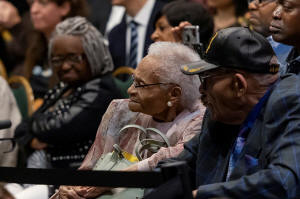Oklahoma top court rejects case by 'Black Wall Street' race massacre
survivors
 Send a link to a friend
Send a link to a friend
 [June 13, 2024]
By Nate Raymond [June 13, 2024]
By Nate Raymond
(Reuters) -Oklahoma's highest court on Wednesday dismissed a lawsuit by
the last two known living survivors of the Tulsa race massacre in 1921
seeking reparations for the violence and destruction that resulted in
the deaths of hundreds of Black people.
The Oklahoma Supreme Court upheld a judge's decision last year to
dismiss the case, saying the state's public nuisance law could not be
relied upon to address the lingering consequences of "unjust, violent,
and tragic moments of our history."
It is estimated that as many as 300 people, most of them Black, died on
May 31, 1921, when a large white mob overwhelmed Tulsa's Greenwood
neighborhood, a prosperous community nicknamed "Black Wall Street."
Lawyers for Lessie Benningfield Randle, 109, and Viola Fletcher, 110,
argued the city of Tulsa and others through the massacre created a
public nuisance of racial disparities, economic inequalities and trauma
that needed to be abated.
They alongside a third massacre survivor who died while the case was
pending, Fletcher's brother Hughes Van Ellis, contended the effects of
the massacre continue to be felt today and that the city and others
should be forced to compensate victims, replace buildings and return
land to the Black community.
But Justice Dustin Rowe wrote that while the "plaintiffs' grievances are
legitimate, they do not fall within the scope of our state's public
nuisance statute," which was limited to problems involving criminal or
property-based conflicts.
"The continuing blight alleged within the Greenwood community born out
of the massacre implicates generational-societal inequities that can
only be resolved by policymakers--not the courts," wrote Rowe, an
appointee of Republican Governor Kevin Stitt.

[to top of second column]
|

Survivors and siblings Viola Fletcher and Hughes Van Ellis listen as
U.S. President Joe Biden delivers remarks on the centennial
anniversary of the Tulsa race massacre during a visit to the
Greenwood Cultural Center in Tulsa, Oklahoma, U.S., June 1, 2021.
REUTERS/Carlos Barria/File Photo

Seven other justices joined Rowe's opinion, while a ninth, Justice
James Edmondson, partially dissented.
The plaintiffs' legal team in a statement said they planned to ask
the court to reconsider its decision, saying "the court system is
the very place where such harms are meant to be remedied." The
lawyers also called on the U.S. Department of Justice to open an
investigation into the massacre.
The Greenwood area had a population of over 10,000 Black residents
at the time when racial segregation was strict and the Ku Klux Klan
had strong membership in Oklahoma.
The massacre began after a white woman told police a Black man had
grabbed her arm in an elevator in a downtown commercial building,
according to an account by the National Endowment for the
Humanities.
Police arrested the man, whom the Tulsa Tribune then reported had
tried to assault the woman.
White residents surrounded the courthouse, demanding the man be
handed over. A white man tried to disarm a Black World War One
veteran and a shot rang out, touching off violence in which 35
blocks of Greenwood were destroyed.
(Reporting by Nate Raymond in Boston; Editing by Cynthia Osterman)
[© 2024 Thomson Reuters. All rights reserved.]This material
may not be published, broadcast, rewritten or redistributed.
Thompson Reuters is solely responsible for this content. |